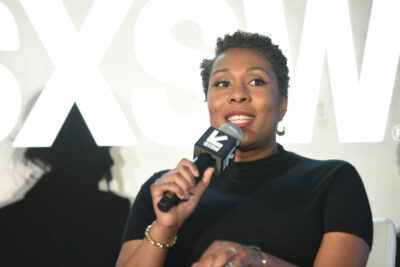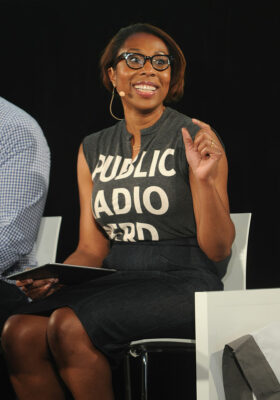A Seat at Audie Cornish’s Table
“The goal isn’t to make people feel foolish or dumb.”
BY REBECCA CARROLL
Veteran journalist Audie Cornish does not come to play. The former co-host of NPR’s All Things Considered has long been considered a serious interviewer (at CNN, where she moved last year, she recently took now-former chief Chris Licht to task for platforming Trump). Now she has a new podcast on CNN called “The Assignment.” And whether it’s questioning a parent activist on their true motivations or talking to an OnlyFans star, she knows exactly what she’s doing and why she’s doing it. As a fellow interviewer who is slightly obsessed with the process, I was eager to hear more about Cornish’s own style—and what stays with her after it’s all said and done.
Rebecca Carroll: You’ve long emphasized your commitment to amplifying the voices of “regular people” in your work. In this social media-crazed landscape—I think I’ve heard you refer to it as the attention economy, where people are not really interested in regular folks unless they go viral—my question for you is, how do you make regular folks interesting?
Audie Cornish: …There wouldn’t be social media if we weren’t all interesting and interested in each other, and it wouldn’t have changed the celebrity journalism landscape. We have a system that rewards what we call “stars”—people who we think have a singular magnetism and talent who are cultivated as such, and put on a pedestal for much of their lives, until we tear them down. I think what I’m saying is…We also can share our actual knowledge, share the wisdom that we’ve learned in our lives, and I’m finding that to be really deeply engaging.
I went all the way back to listen to the first episode of “The Assignment” in preparation for this interview. And in that episode, you are engaged with two parent activists from Florida whose primary concern, it seemed to me, was that teachers in schools are teaching their children with the bias that America is a racist country. But America is a racist country. You navigated the conversation deftly, but I wondered if you ever felt, specifically during that interview, like saying, “Actually, you’re wrong. That’s just not factually correct”?
I think what you’re asking for is a different kind of show. And I don’t mean to be obtuse here, but you saying with such certainty that it’s a racist country—there are very many people who would say the exact opposite with complete and total certainty! And I think that in that first episode what I wanted to introduce to the audience was that this is a show where you’re going to get heard all the way out, and if people dislike you, it’ll be for your best take, not your worst take. The goal is not to make people feel foolish or dumb; it’s to find people who are in the middle of a maelstrom of some kind, who are in the middle of a story that’s changing rapidly, and to find out what it’s like for them.
I think what I wanted to do with that first show is to get everyone situated, no matter what your political beliefs are—to say, “Okay, this is how we’re going to talk at my table.” And there are plenty of places for you to go where people will be like, “You’re racist, please leave.” But this table is not that.

What is it that you’re really trying to do with the show? And how you are feeling as you do it in a climate where we are grappling with divisive news outlets and audiences, and an industry that is under enormous scrutiny in general?
Every single episode is through the lens of: This is a weird corner of the world [where] something’s going on, and what really is it? Is it really a fight about school boards, or is it about your fundamental vision of this country and how you seek to ‘rectify’ a story that’s been told about it? I think [the existing news landscape] makes it really hard for people to understand the scope of problems sometimes. Everything is just kind of something on the internet that makes me mad. I just think not knowing is not helping.
What drives your curiosity, and how do you keep the faith that an interview is going to yield that unique conversation?
I have no such faith. No audience is given unearned. Nobody is owed anything. This is the news. This is journalism. This is actually how my brain works: I want to know, “What are you really getting at? What’s your motivation for being here? Why are you here and not there?” And to me, that’s everything, that’s life. It’s the root of us.
Say more about that.
I just approach everything like a listener. I have questions, and I think that’s really it. That’s not a catchphrase. I think if I had more answers, I’d be an activist. Because then my job as an activist is to imagine the world as it could be and try to convince people to get there. What drives me is question, question, conversation, question, question, conversation. That’s where I live and breathe. I keep going because there’s more stuff to ask, because there’s more to tease out and pull apart to help find clarity.

So who helps you find the clarity?
I mean, my guests? I pick my topics for a reason. I think everyday people do have answers and common sense. They want the same things. They want to take care of their kids. They want to take care of their families. And in general, they don’t want to hurt other people to do it, ideally. I think my nature, as I learned from one of our episodes, as a Libra, is to try to find some kind of balance. I want to find the person who really knows the answer. And I’m just going to keep booking guests until I find them.
And what does it feel like when you find the answer?
Imagine that feeling you had as a kid, that high. Like the moment when you learn something you didn’t know, or you heard something you didn’t know. You never feel that?
But I’m asking you, because you do have a tendency to answer questions with questions.
I mean, it’s real. It’s not a shtick. That’s my high, that’s my drug. And now I’ve learned something new—this conversation is going to transform how I think of you and us, because we had this moment. And that’s very different from the relationship we had before, which was at a distance. I mean technically, I know what you think, I’ve read your work, but I didn’t really know you. I think that people sometimes mistake those online personas as knowing people and what they’re all about, and being able to say, “Fuck off.” I will never be able to say that to you, because we had our moment of intimacy and dialogue, and that’s amazing. I could do that all day.
I wonder about these moments, and both the connections made between you and your guests, and the connection your guests make with each other. Do you miss them after the conversation is over?
Oh my god, I hear their voices in my head all the time. Whatever they felt, I feel for days after. But I don’t regret having [the conversation], and I’ve exchanged lovely notes with them since. But all my notes are pretty much the same, which say, “Thank you.
Rebecca Carroll
Rebecca Carroll is a writer, cultural critic, and podcast creator/host. Her writing has been published widely, and she is the author of several books, including the memoir Surviving the White Gaze. Rebecca is Editor at Large for The Meteor.